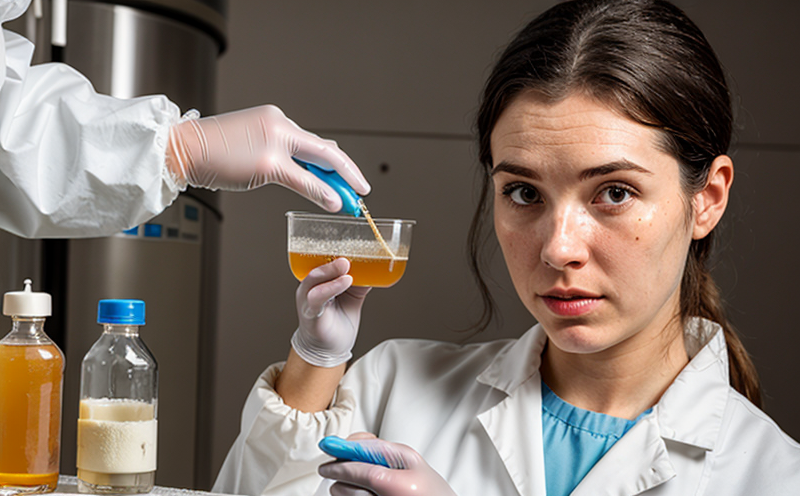EN 15789 Detection of Vibrio and Related Fungal Associations
The EN 15789 standard provides a robust framework for the detection of Vibrio species and their associated fungi in environmental, food, and water samples. This method is essential for ensuring public health and environmental safety, particularly in sectors like food processing, pharmaceuticals, and water treatment.
The identification of Vibrio species is crucial due to the potential health risks they pose when present in high concentrations. These bacteria include pathogenic strains such as Vibrio cholerae, which can cause severe gastroenteritis and cholera. The presence of related fungi, especially opportunistic pathogens, can also complicate environmental and food safety issues.
The standard outlines a comprehensive approach that combines microbiological culture techniques with biochemical and molecular methods to achieve accurate identification. This ensures that laboratories are equipped to handle complex samples and deliver reliable results.
Our team of experts is dedicated to providing precise and timely analysis for the detection of Vibrio species in diverse environments, including water sources, food products, and industrial processes. We ensure compliance with EN 15789 standards by employing advanced laboratory practices and adhering strictly to international guidelines.
The testing process begins with the collection of environmental or food samples, which are then prepared using sterile techniques. The specimens undergo initial screening for the presence of Vibrio species, followed by more specific identification tests such as colony morphology analysis, Gram staining, and biochemical tests like API 20E strips.
Molecular methods, particularly PCR-based assays targeting specific genetic sequences, are used to confirm the identity of isolated colonies. This approach ensures high specificity and sensitivity in identifying even low-level contamination. Once identified, any associated fungi present in the samples are also characterized using similar methodologies.
The results from these tests provide critical insights into potential sources of contamination and help stakeholders implement effective control measures. Our services support compliance with regulatory requirements and enhance overall quality assurance processes within industries.
Scope and Methodology
| Step | Action | Description |
|---|---|---|
| 1 | Culture Preparation | Prepare the culture medium suitable for Vibrio growth and inoculate the sample. |
| 2 | Incubation | Incubate the samples under appropriate conditions to promote microbial activity. |
| 3 | Morphological Analysis | Examine colonies for characteristic morphology and perform Gram staining if necessary. |
| 4 | Biochemical Tests | Carry out biochemical tests using API 20E strips to differentiate between species. |
| 5 | Molecular Techniques | Analyze DNA extracted from colonies via PCR and sequencing for definitive identification. |
| 6 | Fungal Identification | Identify any associated fungi using similar techniques, including morphological and molecular approaches. |
The entire process adheres to stringent quality control measures and is validated against international standards such as EN 15789. Our laboratory ensures that all steps are meticulously documented for traceability and repeatability.
Eurolab Advantages
At Eurolab, we offer unparalleled expertise in biological and microbiological testing services tailored to meet the stringent requirements of EN 15789. Our state-of-the-art facilities are equipped with advanced instrumentation capable of handling complex samples effectively.
We employ highly trained professionals who stay updated on the latest developments in microbiology and molecular diagnostics, ensuring that our methods remain at the forefront of scientific advancements. Our commitment to accuracy and reliability has earned us a reputation as a trusted partner for quality assurance across various industries.
Moreover, Eurolab provides comprehensive support throughout the entire testing process, from sample collection advice to detailed reporting. This includes offering detailed recommendations on corrective actions based on our findings, helping clients maintain compliance and improve their processes continuously.
Why Choose This Test
The EN 15789 detection method offers several advantages that make it indispensable for ensuring the safety of food products, water supplies, and other critical environments:
- Precision: The combination of culture-based methods and molecular diagnostics ensures highly accurate identification.
- Compliance: This testing aligns with international standards, facilitating regulatory compliance.
- Rapid Results: Efficient workflows reduce turnaround time without compromising on quality.
- Cost-Effective: By identifying issues early, businesses can avoid costly recalls and reputational damage.
The ability to detect Vibrio species and related fungi promptly allows organizations to take proactive measures against contamination. This not only protects public health but also enhances operational efficiency by preventing disruptions due to product recalls or shutdowns.





